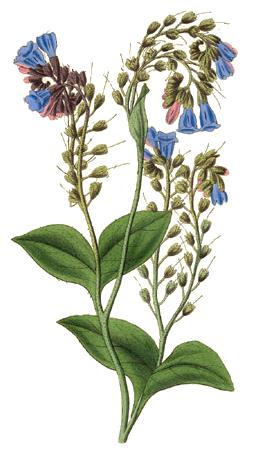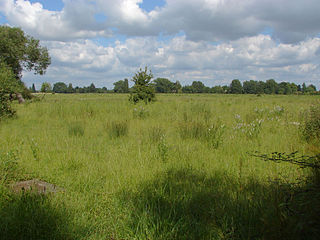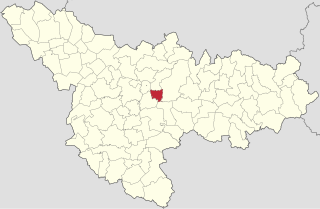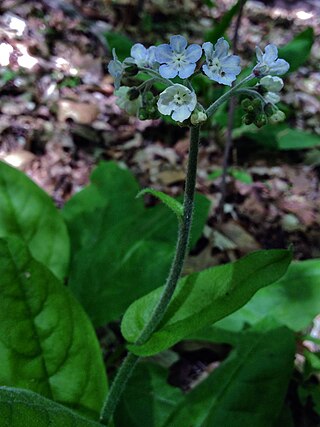
Boraginaceae, the borage or forget-me-notfamily, includes about 2,000 species of shrubs, trees, and herbs in 146 to 156 genera with a worldwide distribution.

Symphytum is a genus of flowering plants in the borage family, Boraginaceae, known by the common name comfrey. There are 59 recognized species. Some species and hybrids, particularly S. officinale, Symphytum grandiflorum, and S. × uplandicum, are used in gardening and herbal medicine. They are not to be confused with Andersonglossum virginianum, known as wild comfrey, another member of the borage family.

Comfrey is a city in Brown and Cottonwood counties in the U.S. state of Minnesota. The population was 382 at the 2010 census. The majority of the people live in Brown County.

Symphytum asperum is a flowering plant of the genus Symphytum in the family Boraginaceae. Common names include rough comfrey and prickly comfrey. It is the tallest Symphytum species. It is native to Asia, and it is known in Europe and North America as an introduced species and sometimes a weed. Symphytum × uplandicum, the naturally occurring hybrid with the common comfrey, is the economically most important kind of comfrey.

Ethmia quadrillella is a moth belonging to the family Depressariidae, subfamily Ethmiinae.

Thorpe Hay Meadow is a 6.4-hectare (16-acre) biological Site of Special Scientific Interest west of Staines-upon-Thames in Surrey. It is owned and managed by the Surrey Wildlife Trust.

Symphytum officinale is a perennial flowering plant in the family Boraginaceae. Along with thirty four other species of Symphytum, it is known as comfrey. To differentiate it from other members of the genus Symphytum, this species is known as common comfrey or true comfrey. Other English names include boneset, knitbone, consound, and slippery-root. It is native to Europe, growing in damp, grassy places. It is locally frequent throughout Ireland and Britain on river banks and ditches. It occurs elsewhere, including North America, as an introduced species and sometimes a weed. The flowers are mostly visited by bumblebees. Internal or long-term topical use of comfrey is discouraged due to its strong potential to cause liver toxicity.

Officinalis, or officinale, is a Medieval Latin epithet denoting organisms—mainly plants—with uses in medicine, herbalism and cookery. It commonly occurs as a specific epithet, the second term of a two-part botanical name. Officinalis is used to modify masculine and feminine nouns, while officinale is used for neuter nouns.

Bucovăț is a commune in Timiș County, Romania. It is composed of two villages, Bazoșu Nou and Bucovăț. Part of the commune of Remetea Mare until 2007, it was established as a separate commune in that year.

Anthophila fabriciana, also known as the common nettle-tap, is a moth of the family Choreutidae first described in 1767 by Carl Linnaeus. The moth can be found flying around stinging nettles during the day.

Symphytum tuberosum, the tuberous comfrey, is a species of Symphytum in the family Boraginaceae.
caucasicum is a species name, "of the Caucasus." Some genera associated with this name are:

Coleophora pennella is a moth of the family Coleophoridae. It is found in most of Europe.

Russian comfrey or Quaker comfrey is a common hybrid between Symphytum officinale and S. asperum. It represents the economically most important kind of comfrey.

Andersonglossum virginianum, known as southern wild comfrey, is a flowering plant in the borage family native to North America. It is also sometimes called blue houndstongue.

Symphytum bulbosum, common name bulbous comfrey, is a flowering plant of the genus Symphytum in the family Boraginaceae.

Symphytum grandiflorum, the creeping comfrey, or running comfrey is a species of flowering plant in the family Boraginaceae. It is native to the Caucasus region, and introduced to various locales in Europe as a garden escapee. A deer-tolerant perennial, it is hardy in USDA zones 5 through 8, and is recommended for borders and shady situations. The unimproved species and a number of cultivars are commercially available. Also, it has been crossed with Russian comfrey to produce the multi-cross hybrid Hidcote comfrey, of which a range of ornamental cultivars are available.
Symphytum peregrinum may refer to the following comfrey species:















